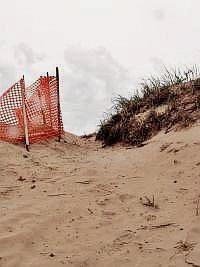|
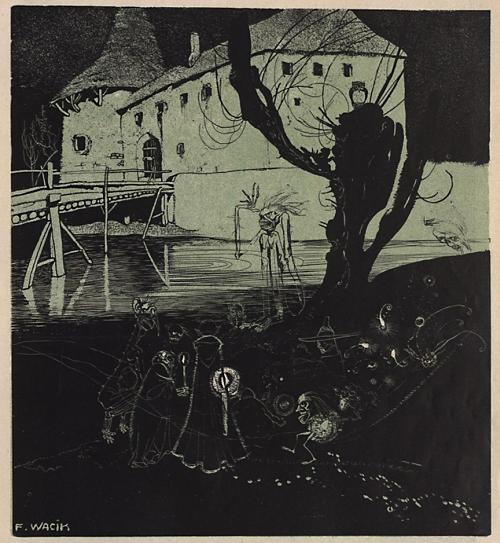
Franz Wacik
Illustrations by Franz Wacik
for the humor magazine Die Muskete
circa 1906–1911 Vienna
50 Watts
_______________________
A new issue of Not Bored!
(the first since 2009)
13th anniversary
_______________________
William Gaddis: A very fine shambles
Paul Griffiths reviews The Letters Of William Gaddis
(....)
Particularly in the years after JR, with his work increasingly known and the world increasingly nosy, he had to defend himself repeatedly against requests for interviews and explanations, sometimes referring his enquirers to words he had given the painter protagonist of The Recognitions: “What is it they want from a man that they didn’t get from his work? . . . What’s left of the man when the work’s done but a shambles of apology”. And the punctuation here indicates this is not really a question.
His letters he would no doubt have regarded as part of the shambles. In 1984, Gaddis replied to an enquiry from Steven Moore, the editor of this volume, then a doctoral student, to warn him that “my early letters were many times written with the vain notion of eventual publication & thus obviously much embarrassing nonsense”. Hugh Kenner’s review of Ernest Hemingway’s letters had shown the danger, for Kenner had used them “to flay the writer & point up frailties in his work as glimpses of the ‘real’ Hemingway, I think really these things go quite the opposite, the letters are the detritus, &c”.
Gaddis kept not only his working materials, however, but copies and drafts of letters, and came to accept, grudgingly, that an edition was inevitable. They are, to be sure, not the work. While they convey the grand, growling Gaddisian voice, only rarely do they lift off with the comma-free, cliché-dosed, looping and wonderfully rhythmic energy of some of the best and funniest passages from his novels, one such exception coming in a letter he wrote soon after a visit to New Zealand in 1987, which for him was most essentially the location of Erewhon. He needed to find a place to work: “which may even end up right here in Manhattan with a terrace & all air conditioning that people kill for hardly that bad after all though glimpses of peace over the bay at Wellington & sheep of Christchurch lead one astray where Butler after all got his first breath . . .”.
...(more)
_______________________
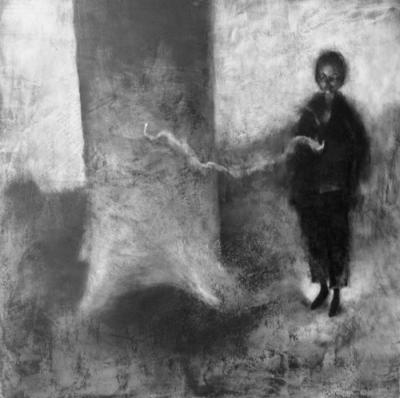
Once Upon A Time
Alexandre Day
Lined In Lead: Works In Graphite
Gallery Nucleus
via
_______________________
The Chorus: I’ve Done Nothing but Contradict Reality from the Outset
Becca Jensen
People think the imagination is imaginative. For example, the
newfangled man took his nose into the air. People and their slender feet
tucked between their thighs laid with dew. People,
are wrong. For example, the imagination is the detritus
of a reality firmly settled to a place. For example,
the lamplight made fish scales of the wall. This cannot be
overemphasized. For example, the disappointment came
from the white feathered mouse-tail of his touch. Here is the thin-laced gesture
of our quiet fate: night
...(more)
High Chair 17
_______________________
Please, No More Poetry: The Poetry of derek beaulieu
reviewed by Genevičve Robichaud
Lemon Hound
(....)
By re-orienting beaulieu’s politics in such an explicit way, Please, No More Poetry becomes a more engaging book than a simple celebration of an author’s work and accomplishments. It becomes a vital and engaging crossroads where these seemingly opposing sociopolitical fronts can meet and battle it out–the radical anti-capitalist disruptions of a poetics founded in disgust versus what Marjorie Perloff refers to as a poetics that is “ideologically suspect” because it is “too empty, or too pretty, or too much like advertising copy”. This is a crucial debate to be having when, with increasing frequency, poetry is declared to be a dead art form. While some writers rush to defend poetry’s relevancy (including writers on this blog), others denounce it as wholesale fodder.
The debates around poetry’s relevancy, value, and meaning are the focal point of the collection. These problems are suggested to the reader before they even open the book: Please, No More Poetry: The Poetry of derek beaulieu. The mouth that issues this grand plea has a tongue rubbing against the walls of its cheek. What does this book produce? More poetry. Please, No More Poetry is a crucial collection that not only looks back on a brilliant career, but looks toward the future of the medium itself, offering a sampling of innovative writing strategies and seeking a place for poets that is relevant, valuable, and meaningful in the contemporary world.
...(more)
_______________________
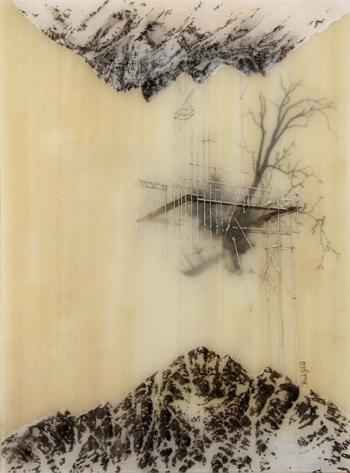
Not So Twinned Mountains
Brooks Salzwedel _______________________
Psycho-Climate Communique #1
arran james
synthetic_zero
Synthetic_Zero
Synthetic_Zero is a project designed to explore the challenges and opportunities of being and becoming human after nihilism. The collaborative approach presented here is intended as an experimental response to the various crises, disjunctions and unequally distributed realities of contemporary life.
‘Nihilism’ has never existed as a unified objective condition or psychological mood, but rather as organizing constellation of references expressing a growing awareness of the dissolution of various claims to truth, methodological faiths, social institutions, political regimes and cognitive orientations. A post-nihilist position thus begins from a recognition of the total collapse of intellectual certainty as well the delegitimization of all existing ideologies.
It is very important not to let this suspicion deteriorate into a truth, or a theory, for example into a theory with the principle: things are never what they seem to be. Reality, or Being, or God, or whatever it is that sustains us cannot be captured that easily. – Paul Feyerabend
Here you will find original and borrowed content engaging crucial issues circulating through speculative realist philosophies, anthropology, psychiatry, social work, political ecology, art, architecture, urban design, indigenous politics, and various contemporary social movements. Our intention is to seek and build bridges between various knowledges and practices in order to cultivate more flexible and adaptive modes of being, perceiving, becoming and expressing in the world.
_______________________

Margaret Bourke-White
b. 14th June, 1904
_______________________
"The dialectical way invests chaotic power in the creation of little machineries of the heterogeneous. By fragmenting continuums and distancing terms that call for each other, or, conversely, by assimiliting heterogeneous elements and combining incomparable things, it creates clashes. And it makes the clashes thus developed small measuring tools, conducive to revealing a disruptive power of community, which itself establishes another term of measurement. (...) The encounter therein of incompatible elements highlights the power of a different community imposing a different measure; it establishes the absolute reality of desires and dreams. But it can also be activist photomontage ą la John Heartfield, which exposes capitalist gold in Adolf Hitler's gullet - i.e. the reality of economic domination behind the lyricism of national revolution - or, forty years later, that of Martha Rosler, who 'brings back home' the Vietnam War by mixing her images with those of adverts for American domestic bliss. Even closer to us, it can be the images of the homeless projected by Krzystof Wodiczko on official American monuments, or the paintings that Hans Haacke accompanies with little notices indicating how much they have cost each of their successive buyers. In all these cases, what is involved is revealing one world behind another: the far-off conflict behind home comforts; the homeless expelled by urban renovation behind the new buildings and old emblems of the polity; the gold of exploitation behind the rhetoric of community or the sublimity of art; the community of capital behind all the separations of spheres and the class war behind all communities. It involves organizing a clash, presenting the strangeness of the familiar, in order to reveal a different order of measurement that is only uncovered by the violence of a conflict."
- Jacques Rancičre, The Future of the Image (trans. Gregory Elliott), 2007.
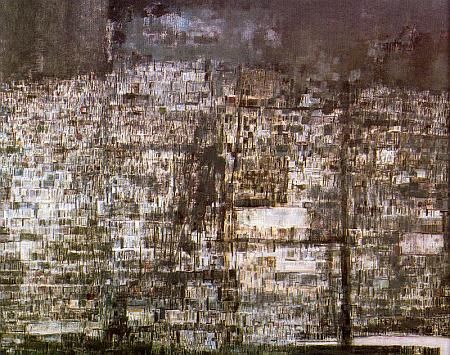
the magic mountain
1979
Maria Helena Vieira da Silva
b. June 13, 1908
_______________________
Sometimes We Stand At Roof’s Edge And Look For Our Universe
Matthew Lippman
(....)
We played with our bodies, made them move like tattletales,
like fractured bones,
the celestial movement of the entire Milky.
Sometimes we stand at the roof’s edge and watch for our universe.
We can never see the whole thing.
When we were children, the whole thing was as visible as today’s little cardinal.
It was red and black and could withstand any sort of hydraulic pressure.
These days our telescopes need as much help focusing
through the disease of orange rind
as our spigots do clean water.
But we look through it anyway.
...(more)
Burnside Review
Volume 9, Number 1
_______________________

break water
photo - mw
_______________________
Rob Winger on Al Purdy
lemon hound
The People’s Poet: Al Purdy as Organic Intellectual
In recent years, I’ve been looking for a contemporary figure who might qualify as what Antonio Gramsci once hopefully envisioned as an “organic” intellectual: a grassroots leader rising up from the exploited masses to lead a proletariat revolution against the ruling bourgeoisie. But does – and could – such a figure ever really exist?
(....)
In the much smaller world of Canadian politics and art, one place to look is Prince Edward County, Ontario, which was home to the figure perhaps most popularly proclaimed as the voice of the little person in Canadian writing: the late Al Purdy. Purdy is, of course, a key figure in Canada’s literary canon, and continues to be praised, by some, as “The greatest Canadian poet of the 20th century” (qtd. in Necropsy of Love, back cover). Always self-identified with physical, male work, his swaggering persona nonetheless belies an arguably “sensitive” poetics, encapsulating a functional tension, in both his writing and reception, between the “high” cultures of poetic production and the “low” cultural values actively espoused in his celebrations of rural vernacular. Might a white, heterosexual, middle-class intellectual figure like Purdy – who remained dedicated to an exclusively male and debatably old-fashioned poetics throughout his career – inspire a social revolution that speaks for “the people” of an increasingly transnational, multi-lingual, culturally-diversified nation?...(more)
_______________________
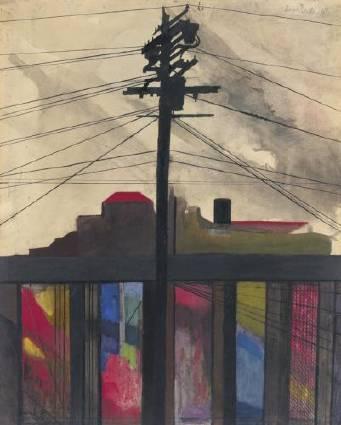
Joseph Stella
b.June 13, 1877
_______________________
Digital Blackwater:
How the NSA Gives Private Contractors Control of the Surveillance State
_______________________
Dante's Sublime Comedy: Hell
Alasdair Gray
Chapter 28: Subvertors
If unrhymed prose could easier describe
the blood and wounds appearing in that ditch,
I’d certainly resort to it, Hell knows.
All speech falls short, there are no words to tell
of all the carnage we enact on earth
and re-enact repeatedly in Hell.
...(more)
_______________________
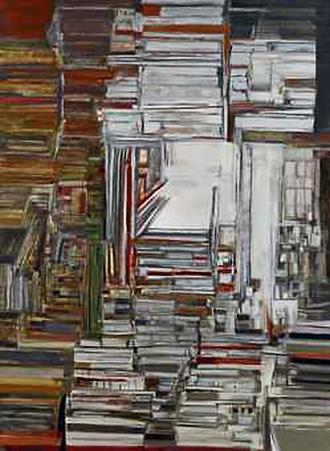
L'issue lumineuse
Maria Helena Vieira da Silva
_______________________
Two Poems for Anselm Hollo
by Vyt Bakaitis and Alice Notley
brooklyn rail
_______________________
Similar:Peaks
an introduction of sorts
David Blumenshine
hello.
allow me to reintroduce myself, my name is
Similar:Peaks::
you don’t know about that do you? well, actually, i suppose the name is Similar:Peaks::Poetry, but that misrepresents our mission & vision. we are a literature focused journal. for now, we are merely online. but what is & what will be are not equal. for now it’s not important. what is important, at least to us, is that tomorrow begins the set-it-off of an idea which has been in-process for quite some time, & with an intense amount of hard work combined with an overwhelmingly warm response from the literary community we identify with, will finally fruition tangibly.
my name is david blumenshine. officially co-founder and editor in chief of operations herein. while i work manual labor during non-rain hours, i have been fortunate enough to have my own work published in or coming soon from Passages North, Bluffs, Seven Corners, Paper Darts, & Smoking Glue Gun. Along with co-founder and senior editor of awesome (accordingly the artwork which the site is using can be attributed to) Rachel Burns, my partner & confidant, Similar:Peaks:: was conceived several months ago, largely in vague & short lived conversations of how unlikely what has is.
...(more)
via Camille Martin_______________________
The world of poetry is changing. This has consequences.
Ron Silliman
_______________________
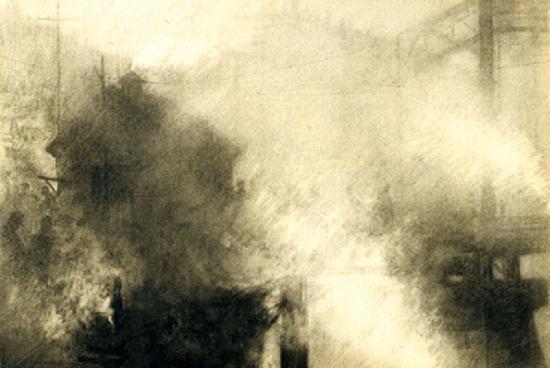
Morning Mist at the Mine Mouth
[Monongah, West Virginia]
1908
Joseph Stella _______________________
John Ashbery: “The Skaters”
[from Rivers and Mountains, 1966]
– a critical and genetic digital edition –
I
These decibels
Are a kind of flagellation, an entity of sound
Into which being enters, and is apart.
Their colors on a warm February day
Make for masses of inertia, and hips
Prod out of the violet-seeming into a new kind
Of demand that stumps the absolute because not new
In the sense of the next one in an infinite series
But, as it were, pre-existing or pre-seeming in
Such a way as to contrast funnily with the unexpectedness
And somehow push us all into perdition.
Here a scarf flies, there an excited call is heard.
The answer is that it is novelty
That guides these swift blades o’er the ice,
Projects into a finer expression (but at the expense
Of energy) the profile I cannot remember.
Colors slip away from and chide us. The human mind
Cannot retain anything except perhaps the dismal two-note theme
Of some sodden “dump” or lament.
But the water surface ripples, the whole light changes.
We children are ashamed of our bodies
But we laugh and, demanded, talk of sex again
And all is well. The waves of morning harshness
Float away like coal-gas into the sky.
But how much survives? How much of any one of us survives?
The articles we’d collect—stamps of the colonies
With greasy cancellation marks, mauve, magenta and chocolate,
Or funny-looking dogs we’d see in the street, or bright remarks.
One collects bullets. An Indianapolis, Indiana man collects slingshots of all epochs, and so on.
...(more)
Text/worksRobin Seguy, editor
A Modern Poetry Library
Text/works has the ambition to be the first multilingual online library making available to scholars and general readers collections of French and American Modern poetry (19th, 20th, and 21st Century) in the form of critical digital editions.
The goals of Text/works are multiple.
First, we intend to offer to the general reader authoritative editions of poetic texts and collections, to be read online or downloaded (in XML-TEI and PDF). Contrary to many existing databases, we aim to display the texts we publish with accurate philological care and try to reproduce, as far as possible, their original printed appearance. We will also integrate, whenever possible, genetic data, and collate several editions in cases of variants. For each text, hyperlinked indexes are to be built, as are sets of thematic annotations.
Moreover, we aim, for the profit of literature scholars, students, and teachers, to develop and make available research tools for text analysis. In a second stage of its development, our library will thus include a part-of-speech tagging for each texts, as well as prosodic and metrical annotations, so as to provide data for searchers interested in a corpus-based approach of modern poetry texts. If the literary text is to offer, in Ponge's words, “ą la fois une jouissance et une leēon,” we do hope that our library will, in its modest way, not be completely useless to help the reader delineate a few coordinates of pleasure and enlightenment.
_______________________
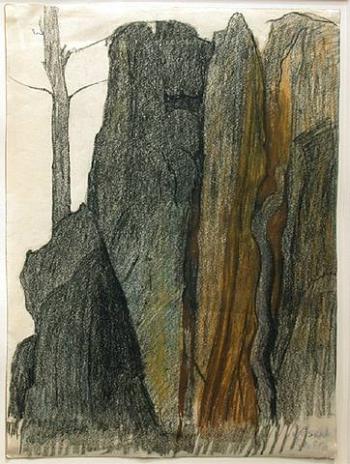
Cliffs and Rocks
c. 1925
Joseph Stella
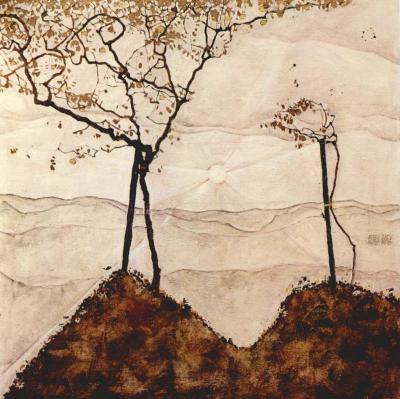
Egon Schiele
June 12, 1890 – October 31, 1918
_______________________
Thomas Hardy Considers the Newly-Published Special Theory of Relativity
Brian Aldiss (1981)
Doubtless a way there is of grasping whole
This troubled cosmos where we fare and die,
Of grasping, and forgiving much thereby.
Well, some will chance, when I lie in the grave,
To quest like Albert Einstein for a key
To ends far obscured. Then let those brave
Unlock the universe’s mystery,
Not I. If, with the Immanent Will’s consent,
Mankind should gain some means to cancel space
And time, to view eternity’s bleak face,
Such vision could wreak endless dole – and fright
The human hopes of far futurity
With woes yet stored, worse far than those which blight
Maids whom I know, and men who once knew me.
introduced by Michael Caines
_______________________
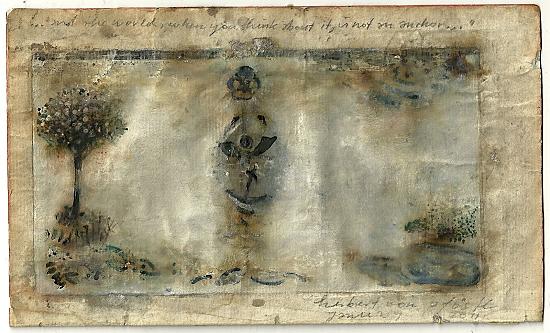 Herbert Pfostl
"And the world, when you think about it, is not an anchor."
Herbert Pfostl's Paper Graveyard
_______________________
The Closure Delusion
Linda Besner
hazlitt
(....)
Closure dominates media representations of sorrow. But within the psychiatric profession, there is a faction that believes closure doesn’t exist. Stephen Grosz, author of The Examined Life, has the grave, understanding voice of a somber child’s imaginary friend, and he has treated countless patients dealing with loss. “For the person who’s mourning, there isn’t an end,” he told me. “As long as you’re alive you can feel grief.” What’s more, he says, our cultural discourse of closure may be hurting these people. Grosz felt that his patients “were suffering more from a tyranny of ‘shoulds’—you should be through this by now, you should have finished with this, set this aside. That really...”—he laughs, which, as he notes elsewhere in his book, people do when they are angry—”that really bugs me.”
(....)
If closure is a null concept, and all of our rituals are ultimately doomed to fail in their goal of making us feel better in a lasting, static way, what’s the alternative? The only other option is to accept that after loss, grief, or trauma, we will always live with some degree of pain. It goes away, but it usually comes back, in one form or another. As a society, we have trouble accepting that terrorist attacks, school shootings, and natural disasters will have a permanent effect on our national psyche. But on an individual level, many are ready to live alongside their grief. In the Huffington Post, Joan Sutton recently wrote:
Do. Not. Speak. To. Me. Of. Closure. What a hideous word. Closure. If you have truly loved someone, you do not ever want to close off the memory of that love, the richness of that experience. Let me be strong enough to absorb this death into my life, let it deepen my understanding of the mystery of life, let it make me wiser. Bring me acceptance but, never, closure. ...(more)
_______________________
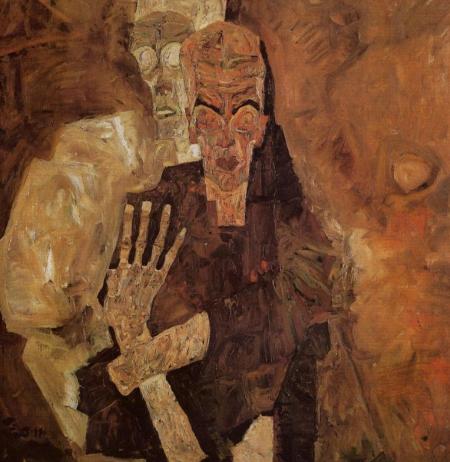
The Self Seers
(Death and Man)
1911
Egon Schiele
_______________________
from
Appearances: A Novel In 365 Fragments
Tom Beckett
(....)
16.
What are the essential confusions?
What degree of resolution do you require?
17.
The name of this intersection is liminality.
18.
The constellations of Characters constitute Exteriority’s Chorus. It rumbles
beneath the pavement.
Overtures and apertures, voices, shadows, screens, frames, alter egos. Sliding
registers.
19.
The Author (Arthur?) is thinking now about secret identities, metafiction, and the
textual/sexual unconscious.
The Author (who?) is what?
Things are never quite what they appear to be. Some essential aspect is
indiscernible. Size figures. Things, persons, events almost always loom larger or
smaller than one thinks.
...(more)
_______________________
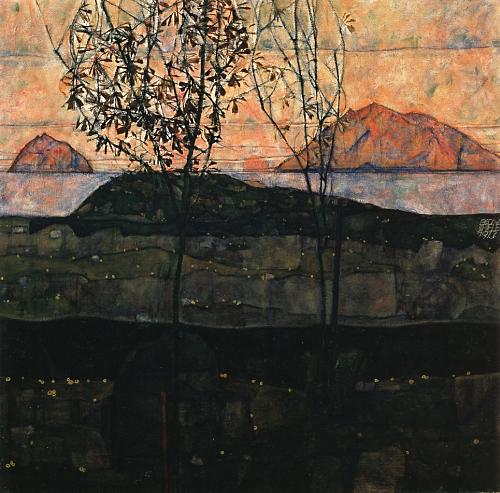
Setting Sun
1913
Egon Schiele
_______________________
Foucault and social media: life in a virtual panopticon
Tim Rayner
(....)
How did we ever get by without social media? In under a decade, free online services like Facebook, Twitter, and LinkedIn have utterly transformed how we work, play, and communicate. For hundreds of millions of people, sharing content across a range of social media services is a familiar part of life. Yet little is known about how social media is impacting us on a psychological level. A wealth of commentators are exploring how social media is refiguring forms of economic activity, reshaping our institutions, and transforming our social and organizational practices. We are still learning about how social media impacts on our sense of personal identity.
The French philosopher Michel Foucault (1926-1984) has a set of insights that can help clarify how social media affects us on a psychological level. Foucault died before the advent of the internet, yet his studies of social conditioning and identity formation in relation to power are applicable to life online. Seen from a Foucaultian perspective, social media is more than a vehicle for exchanging information. Social media is a vehicle for identity-formation. Social media involves ‘subjectivation’.
A Foucaultian perspective on social media targets the mechanism that makes it tick: sharing. Sharing is basic to social media. Sharing content is not just a neutral exchange of information, however. Mostly, when we share content on social media services, we do it transparently, visibly, that is in the presence of a crowd. The act of sharing is a performance, to an extent – it a performative act, an act that does something in the world, as J.L. Austin would say. This is important. The performative aspect of sharing shapes the logic and experience of the act itself.
...(more)
Part 2. I tweet, therefore I become
Part 3. The call of the crowd
Philosophy For Change
via attempts at living
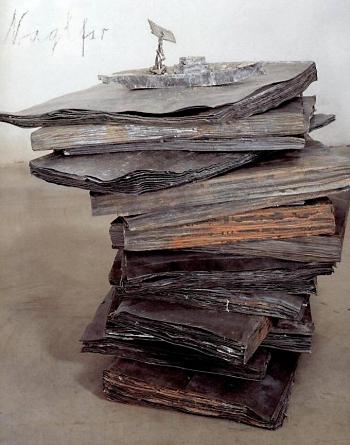
Anselm Kiefer
“The book, the idea of a book or the image of a book, is a symbol of learning, of transmitting knowledge.. I make my own books to find my way through the old stories.”
Anselm Kiefer
_______________________
Moving On
Stanley Fish
I have sold my books. Not all of them, but most of them.
(....)
The ostensible reason for this de-acquisition is a move from a fair-sized house to a much smaller apartment. It is true, as Anthony Powell said in a title, that books do furnish a room, but in this case, too many books, too little room. But the deeper reason is that it was time. What I saw on the shelves was work to which I would never return, the writings of fellow critics whom I will no longer engage, interpretive dilemmas someone else will have to address. The conversations I had participated in for decades have now gone in another direction (indeed, in several other directions), and I have neither the time nor, if truth be told, the intellectual energy required to catch up. Farewell to all that. So long, it’s been good to know you. I’m sure you’ll do fine without me.
(....)
Actually, I’ve had stronger emotional responses to checking out of some motels than I had to the departure of the record of my professional life, a record that includes voluminous marginal notes in many of the volumes. I had always thought that I could return to my annotated copies of familiar texts and pick up where I left off. That fantasy, I now see, was part and parcel of the core fantasy that I would just go on forever, defending old positions, formulating new ones, attending annual conferences, contributing to essay collections, speaking at various universities, teaching the same old courses, confidently answering the same old questions.
I’m not going to go on forever. I avoid this realization, even as I voice it. I say, “I’m not going to go on forever,” and at the same time I’m busily signing new contracts, accepting new speaking invitations, thinking up new courses, hungering after new accolades. My books are clearer-eyed than I am. They exited the stage without fuss and will, one hopes, take up residence in someone else’s library where they will be put to better uses than to serve as items in a museum, which is what they were when they furnished my rooms....(more)
_______________________
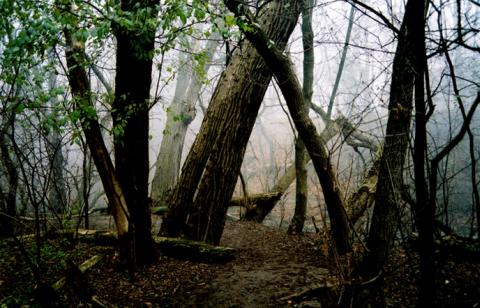
Helena Kvarnström
_______________________
from ‘The Journey of Metaphor & Remembrance’ in Labyrinth of Vision
Bruce Stater
presented by Jerome Rothenberg
Say the poem is a journey
taken with silent walking sticks
on a path strewn with memories
deaf, dumb,
blind & beyond measure.
Its mouth filled with words
its pockets filled with stale bread.
Say it is an elixir derived from chlorophyll
or the royal jelly of expressionistic bees.
Say its stops & turns are towers, shrines
or little discomforts in sleep.
That each of its shafts pierces
a separate element of dream.
That its bewildering sunlight
is a glittering city where ecstasy dances
hand in hand with death.
It was something I went
looking for.
I was afraid of getting
lost. & so I hid
in the island of branching voices
illuminated by the ubiquitous pathos
of forgetting. Something had
torn a hole in my heart
like a leaf, extended finger,
or bone. & so I stuck
to the honey of something
heavy & eternal--
a breath where celestial light
fell in spurts
dampening the pain
of the infinite unmooring.
...(more)
Labyrinth of VisionBruce Stater Ahadada Books
_______________________
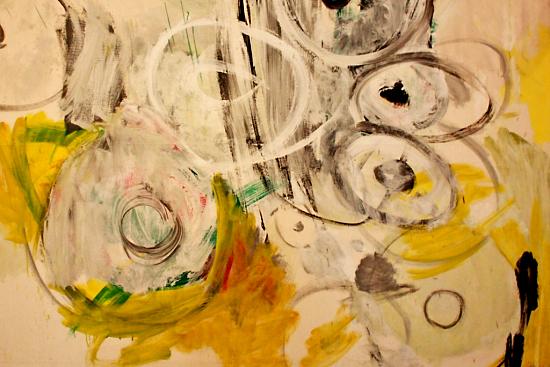
Ernst Wilhelm Nay
b. June 11, 1902
_______________________
New Anxieties
The #tumblresque is not John Berger's Ways of Seeing but sprays of seeing.
(Wark 2012)
What is it about the New Aesthetic that makes you so damn uneasy? There’s a deeply intriguing quality about the New Aesthetic that is more remarkable than any of its merits: it cannot be ignored. Since Bruce Sterling’s first essay popularized the term, the Tumblr that stood as its main platform of communication, and the group of ideas, references and icons that its originators gathered under its umbrella have been refuted, dissected, mocked, celebrated or laughed at. Those who have felt obliged to enter the debate about the New Aesthetic come from philosophy, from new media art practice and curation, from interaction design or from the digital humanities. But almost no one has passed on the opportunity to say something; nobody has just shrugged with indifference and said 'they can’t be bothered'. The fact of the matter is, everyone seems bothered, somehow.
This needs to be investigated because, quite clearly, it says something about the state of these disciplines and those who are working today in this cultural space. While it would be almost impossible to find any unconditional apologist for Bridle's proposition, it’s even harder to find indifferent commentators. Whatever the New Aesthetic is, it's a set of ideas that can make you feel twitchy and uncomfortable, for a range of reasons depending on who you are: the academic, the digital curator, the new media artist. Whether we call it a brand or a half-formed body of theory, it reflects back insecurities, biases, or feelings of inadequacy as often as it attracts valid critical responses.
But what would happen if we properly embraced the New Aesthetic as a topic for network culture?...(more)
_______________________
The Paradox of Mental Health: Over-Treatment and Under-Recognition
The PLOS Medicine Editors
Among all the conditions in the world of health, mental health occupies a unique and paradoxical place.
On the one hand is over-treatment and over-medicalization of mental health issues, often fueled by a pharmaceutical industry interested in the broadening of the boundaries of “illness” and in the creation of more and wider diagnostic categories and thus markets for “selling sickness.” On the other hand exists profound under-recognition of the suffering and breadth of mental health issues affecting millions of people across geographies, which is a global problem.
As a journal, PLOS Medicine has covered both sides of the mental health “coin,” ......(more)
via Eliot Gelwan
_______________________
Linguistic Anxiety and the Deconstruction of the Self in the Realm of the Ridiculous
J.J. Phillips
exquisite corpse
(....)
Again, when I tried to explain, he insisted that I made no sense. When in frustration I said “Lacan, you know, Jacques Lacan,” he impatiently claimed that he couldn’t understand me and had no idea what or whom I was referring to. Since I’d studied French (though long ago), had read Écrits3 and some of Lacan’s other writings, and had engaged in a number of conversations about Lacan with various people over the years, among them an acquaintance, a Francophone MFCC, who’d never drawn a blank when I spoke the name, it couldn’t have been my pronunciation unless I’d suddenly lost control of my faculty of speech and didn’t know it. When in desperation I took a pen and paper and wrote down the name “Jacques Lacan,” the doctor grew even more annoyed and again professed ignorance. No matter what efforts I made, he resolutely refused to acknowledge this name and kept dismissively insisting that I wasn’t making any sense and was revealing my pathetic ignorance, not only of French but of English. My continued impertinence was more than he could bear. He had no more time to waste on the likes of me. As he turned on his heel, the corners of his white coat flapped. He left me standing there stunned and mute – to pay my bill for being professionally vilified and go home.
Even if I didn’t know how to spell or use the English word “laconic,” staging this elaborate fit of pique to ridicule me in this manner, and within earshot of his staff, wasn’t ‘just’ a gratuitously cruel and outrageous way to treat anyone, especially someone in a vulnerable psychological state, who’d come to him seeking help. His petulant refusal even to attempt to understand what I was getting at (not to mention refusing to understand me when I was making sense) and casually degrading me as he did, was completely discombobulating and deeply destructive psychologically and neurobiologically. And he got off on it. I wasn’t in training to be an analyst – where I get the impression that such practices are frequently de rigueur, part of the rites of passage; though I also learn that for some, sadistic degradation and mind-fucking patients is a clinical style, which could perhaps be termed Zilboorgian, after Gregory Zilboorg, George Gershwin’s analyst.
The lodestone of my internal compass instantaneously demagnetized. The fear that I might not be making sense, and that even if I was, my words could summarily be declared gibberish at any time without examination, at the whim of any jerk with an engorged but brittle ego and a sadistic streak, stoked my already considerable anxiety regarding my basic linguistic and cognitive competency, and profoundly destabilized my sense of self to the degree that I was stupefied. When I left his office, I hardly knew which direction to take and my otoliths were so rattled that I couldn’t make my way down the street in a straight line or walk without stumbling. It’s a wonder I found my way home without being hit by a car. This was much more than an attack on my psyche and a semi-public humiliation: he was fucking with some critical areas of my brain, and it was a calculated attack. I couldn’t have been made to feel more stupid and worthless, and he knew it. He set me up and sucker-punched me, and I walked out of his office disoriented and reeling just as sure as if he’d actually slammed me in the solar plexus with his fist.
...(more)
_______________________
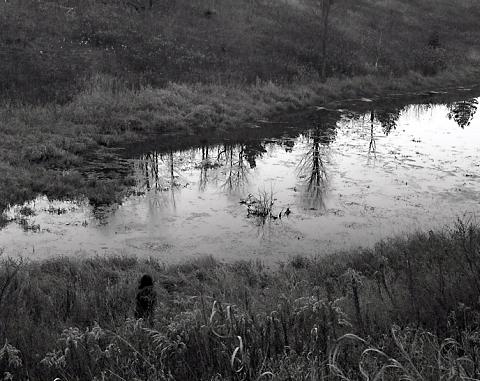
Helena Kvarnström
_______________________
Stones
Bruce Stater
I gather stones.
I am tired.
My mind is empty.
It is difficult to work.
I gather stones.
Some broken, some smooth.
Some heavy and too large for my hands.
Some that roll across my palms, light as a feather.
Some hard and sturdy, others brittle,
Eager to crumble into grains of sand, form clouds of dust.
Some warm, soft and smooth as clay,
Separate prayers created from flesh of living earth.
Some cold and gray and dead as ash.
I gather stones.
I put thought to thought
Pebble beside pebble
To shore up rent and void of no-thought.
Mingle clay with ash and draw earthworm from frozen tundra.
I scoop dried grass from cold ground up to my knuckles
And draw my nails across the hard skin of blocks of ice.
I cover my face with red, yellow, black, brown, and green dirt.
I boil roots and mud in stone soup.
I collect the shells of insects the bones of reptiles, birds and small
mammals
And plant seeds where some will grow and others won't.
I am tired.
It is difficult to work.
My mind is empty but my arms are full of stones.
...(more)
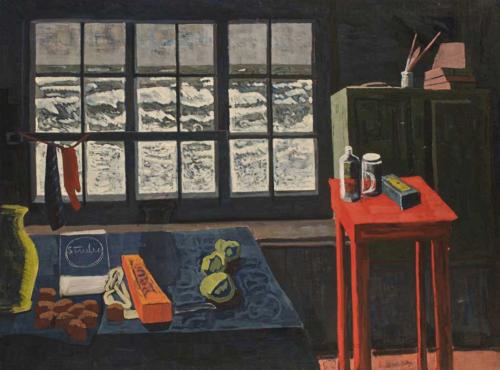
The Blue Studio
c.1947-8
Wilhelmina Barns-Graham
b.June 8, 1912
_______________________
Writing silence
Mervi Kantokorpi
Translated by David Hackston
Books from Finland
Within the mirror
Harry Salmenniemi
Translated by David Hackston
Then, not now. White birches against the white
sky. A vase in the middle of the room.
An attempt to make contact, but with what? The room slowly
fills with whisper and touch. A woman,
turning to catch herself in the mirror,
is afraid the phone will start ringing and startle
her. A gap-closer, not an equaliser.
Beneath the bridges, faces around the fire, these, those.
A ship colliding with the quayside, wind rising,
lost among the rocks, visibility in a sea of buoys,
fog. The story of where I shall end up once
I’ve been travelling long enough. Exotic
animals make a deep impression on the child.
Eyes press half-closed. I know
this might come to nothing, neither good
nor bad. The dull clank of metal on bone,
strikes at various consciousnesses, sometimes in Iceland,
near the coast, whale bones and tanks.
...(more)
.....................................................
Twisted tongues
Miia Toivio
Translated by David Hackston
She said, it was I who said, alone, my feelings confused. Should I somehow have cleared my head, though all I wanted to do was write in the water? ‘Behind me I drag desire’s reflection, like the skirts of a boat sinking towards the depths,’ she once bespoke me. ‘Your skirts are heavy with algae and their smell would banish even the insects. A deer, swimming across a long lake, becomes entangled by the heel, only worsening things as it thrashes there, until it too falls straight down, never floating, to the bottom of the lake,’ I replied. She turned her back and leant against the wall. I couldn’t see her fingers as she, controlling the sound, ripped off a small, wriggling fin, closed it in her fist and turned towards me with an unnatural smile:
*
She who said nothing lay spoken there. She would rather tear out her tongue with her own hands than give her basket full of yellow plums, folded sheets and all that blended scent. In the blended scent she spoke, her voice through my voice: deny one thing, deny another, deny them all if you will, but no one will listen to your playing. That’s what it’s like: through a twisted tongue the body must strive forth or yield to the wishes of a little lass. Other winds will no longer blow: even sweet tumult will lead us to a wuthering wood, forever echoing with the sound of the summer earth, only the wind in the forest trees, the forest trees swing ding, ding, ding.
...(more)
_______________________

Iceland
Kim Høltermand
_______________________
Shifting the (Im)balance
Race and the Poetry Canon
Evie Shockley
(....)
This convergence of critical conversation about Dove’s anthology (Penguin Anthology of 20th Century American Poetry) prompts me not to offer a point-by-point rebuttal of their critiques, nor to offer a defense of the anthology Dove produced, nor to unpack the racist implications of the scholars’ claims (separated from the question of intent). Several such responses, well worth reading, already appear in a variety of print and electronic publications. Instead, I want to contend that the commonalities and points of overlap between Perloff’s and Vendler’s takes on the anthology reveal the troubling role of race in U.S. literary culture at this moment. As Toni Morrison does in her incisive book Playing in the Dark, I question what racial discourse makes possible in a literary context, and highlight the way race stands in for matters of class, professional territoriality, and aesthetics at stake in this conversation. Race is not beside the point, but is made, through a trick of mirrors, to shadow all points.
Race is raised quickly and repeatedly in both essays. Vendler’s review opens with a lament that Dove’s anthology damages the glorious, worldwide reputation of twentieth-century American poetry, a reputation founded on the work of such poets as T. S. Eliot, William Carlos Williams, and Marianne Moore. She writes: “Rita Dove, a recent poet laureate (1993–1995), has decided, in her new anthology of poetry of the past century, to shift the balance, introducing more black poets and giving them significant amounts of space, in some cases more space than is given to better-known authors.” Perloff makes a similar point, just as early in her discussion of the anthology: “One surmises from the table of contents of this chronological survey that Dove, from her perspective as a woman of color, has included many more minority poets than is usually the case.” This racial quantification of the anthology’s contributors and pages (with its troubling echo of quota systems of previous decades) draws attention to what we might call the economy of the canon. Though the canon itself is intangible, the anthologies in which the canon is made, reiterated, or revised are quite material and have—in their print versions, at least—a limited amount of space. What concerns both scholars primarily, we might say, is the room in the anthology that is available or allotted to the poets and poetics they most appreciate.
...(more)
_______________________
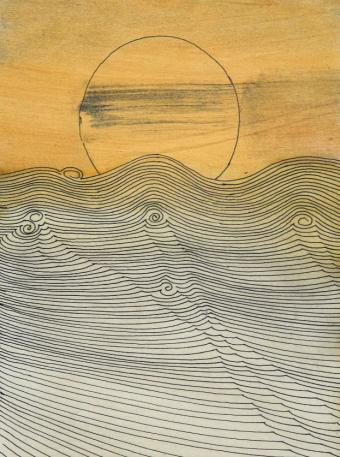
Wilhelmina Barns-Graham
_______________________
Faith in the Unseen
Curtis White’s ‘Science Delusion’
Eric Banks
(....)
Is there really a menace to the humanities in the breezy flourishes of a Richard Dawkins or a Stephen Hawking? White believes that the remarks of such thinkers matter immensely in an environment that glorifies science, one in which lectures by theorists like Krauss attract more than one million YouTube viewers and a TED presentation of the “connectome” speculations of Sebastian Seung is a hot ticket while attendance at symphony halls dwindles. The connection between the two, as if the lovers of the classical repertory might not significantly overlap with the viewership of lectures on neuroscience, is the kind of implicit dichotomy assumed throughout “The Science Delusion.”
White says that high culture and science are battling over a shared ground, and that the gain of one means the retreat of the other. And he is adamant that the emergence of a new form of science storytelling, wedded to entertainment outlets like TED Talks, is creating a monster that substitutes flashy wonder for hard thinking and insulates the practice of science from a real-world political context of value decisions, large capital investment and dubious technological offshoots.
He is unhappiest when it comes to popular science journalism, which he views mostly as a malodorous brew of gushing prose mixed with a dash of snake oil: “The thing that I find most inscrutable about all of the recent books and essays that have sought to give mechanistic explanations for consciousness, personality, emotions, creativity, the whole human sensorium, is how happy the authors seem about it. They’re nearly giddy with the excitement, and so, for some reason, are many of their readers.”
...(more)
_______________________

photo - mw
_______________________
Playing the Blues: Pete Townshend's Who I Am and Music as Experimental Autobiography
Tim Keane
electronic book review
(....)
... the proliferation of pronouns like "you" "we" or "I" in The Who's musical catalog reveals that the band's main lyricist, Pete Townshend, envisioned rock composition as a hypothetical dialogue in front of, and alongside his audience, around a shared autobiographical question: who am I? Townshend's extensive body of songwriting demonstrates an aptitude at infusing, into the subtext of the lyrics, a horizon of performer-audience interchangeability. The songs arise from severe tension as their various personae seek relief from profound autobiographical doubts. In the song "The Real Me" (1973) a rootless young London mod seeks to know himself by consulting his mother and his "shrink," his friends and his would-be lover. Driven into a breakneck sonic register by lead singer Roger Daltrey's delivery, the chorus of "The Real Me" ecstatically besieges both the singer’s implied self and the listener with an interrogation they are presumed to share: "Can you see the real me? Can you? Can you?"
This conscious ambition to mark rock music as a new type of creative social autobiography hovers around The Who's songwriter Pete Townshend's official memoir, Who I Am (2012), published in late 2012 by HarperCollins, sixteen years after the book was contracted and thirty years after The Who retired as an active recording group. Given Townshend's public and private confrontations with identity, struggles which inform most of his music and many of which have made headlines, this memoir has a hard act to follow. In fact, the memoir's title Who I Am is a tacit acknowledgement that Townshend's creative autobiography already courses through his songwriting in ways that are far less apparent than in the work of other recent musician/memoirists, like Neil Young or Keith Richards.
The Augustinian self-interrogation, "Who are you?" has already been answered across several decades by Townshend's music. In "I'm a Boy" (1965) a young man bristles at his English provinciality and complains about a forced cross-dressing by his sadistic parents. In "I'm One" (1973) a soulful, isolated "loser" attempts to resolve a near schizophrenic nervous breakdown with a mystical assertion about himself. In "I am an Animal" (1980) a middle-aged rock star acknowledges himself as a degenerate who has decided his wretched behavior has become, in fact, his reason for being. Such capsuled fictive autobiographies course throughout Townshend's songbook: "I'm the Face" (1964) "[I'm a] Substitute," (1966), "I'm Free" and "I'm a Sensation" (1969), "[I'm a] Seeker" (1970) "I am the Sea" (1973), "I'm Gonna Get Ya" (1980) "I am Secure (1985), and "I am Afraid (1993), along with other musical rejections of a fixed personality, like "I Can't Explain" (1965), "I've Had Enough" (1973) and "I Don't Even Know Myself" (1973).
To paraphrase Walter Pater, then, we might ask, has Townshend's written autobiography that aspires to the condition of his music?...(more)
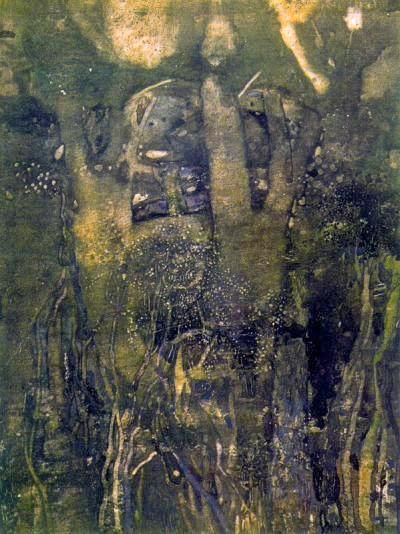
At the Edge of the Wood
Charles Rennie Mackintosh
1913
_______________________
Peter Culley: A Letter to Hammertown
lemon hound
1.
The orange chestnut canopy has shredded
into a discarded hamper
of wet umber, umber-orange,
lacy amber, blood-orange
& bloody amber rags
through which tires carve calm channels in time,
neat stripes of a general widening
as the averages catch up.
I snobbishly note on Shasta’s behalf
the oddly spindly thighs
of her underemployed big city sisters
short-leashed
by fedora dad or leopard mom
insulting white bags
threaded through their collars
a badge of slavery–
no sniff, no FIELD, no flicker.
On the soundwalk the light
is louder than I remember,
darkest in the undertree gloom
dramatic gravel bony underfoot
until cranked across by cable car,
eighties rain filtering
through a carpentered forties porch
onto the basement suite stairwell.
Twin ghosts of my brother
pass each other at different times
& don’t look up.
wary, preoccupied, in transit.
...(more)
Peter Culley at EPC and New Star Books
_______________________
The Endless Crisis as an Instrument of Power:
In conversation with Giorgio Agamben
verso
(....)
Perhaps there is nowhere else in the world, apart from Europe, where such a variety of cultures and life forms is perceptible – at least at valuable moments. Earlier on, as I see it, politics was expressed in the idea of the Roman empire, later the Roman-German empire. The whole however always left the particularities of the peoples intact. It is not easy to say what could emerge today in place of this. But quite certainly a political entity by the name of Europe can only proceed from this awareness of the past. It is precisely for this reason that the present crisis strikes me as so dangerous. We have to imagine unity first of all under an awareness of differences. But quite contrary to this, in the European states, schools and universities are being demolished and financially undermined, the very institutions that should perpetuate our culture and arouse living contact between past and present. This undermining goes together with a growing museumification of the past. We have the beginning of this in many cities that are transformed into historical zones, and in which the inhabitants are forced to feel themselves tourists in their own life world.
Is this creeping museumification the counterpart of a creeping impoverishment?
It is quite clear that we are not just faced with economic problems, but with the existence of Europe as a whole – starting with our relationship to the past. The only place in which the past can live is the present. And if the present no longer perceives its own past as something living, then universities and museums become problematic.
...(more)
via Mark Thwaite
_______________________

"Sea Pink, Holy Island"
July 1901
Charles Rennie Mackintosh
(7 June 1868 - 10 December 1928)
_______________________
I type, therefore I am
More human beings can write and type their every thought than ever before. Something to celebrate or deplore?
Tom Chatfield
aeon
.
.. All future histories of modern language will be written from a position of explicit and overwhelming information — a story not of darkness and silence but of data, and of the verbal outpourings of billions of lives. Where once words were written by the literate few on behalf of the many, now every phone and computer user is an author of some kind. And — separated from human voices — the tasks to which typed language, or visual language, is being put are steadily multiplying.
(....)
In many ways, mass articulacy is a crisis of originality. Something always implicit has become ever more starkly explicit: that words and ideas do not belong only to us, but play out without larger currents of human feeling. There is no such thing as a private language. We speak in order to be heard, we write in order to be read. But words also speak through us and, sometimes, are as much a dissolution as an assertion of our identity.
In his essay ‘Writing: or, the Pattern Between People’ (1932), W H Auden touched on the paradoxical relationship between the flow of written words and their ability to satisfy those using them:
Since the underlying reason for writing is to bridge the gulf between one person and another, as the sense of loneliness increases, more and more books are written by more and more people, most of them with little or no talent. Forests are cut down, rivers of ink absorbed, but the lust to write is still unsatisfied.
Onscreen, today’s torrents of pixels exceed anything Auden could have imagined. Yet the hyper-verbal loneliness he evoked feels peculiarly contemporary. Increasingly, we interweave our actions and our rolling digital accounts of ourselves: curators and narrators of our life stories, with a matching move from internal to external monologue. It’s a realm of elaborate shows in which status is hugely significant — and one in which articulacy itself risks turning into a game, with attention and impact (retweets, likes) held up as the supreme virtues of self-expression.
...(more)
_______________________
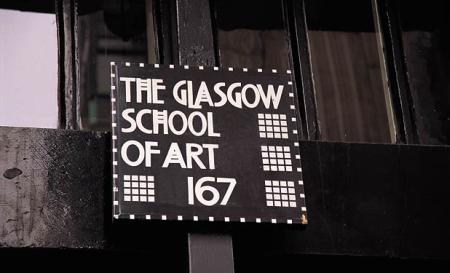
Charles Rennie Mackintosh
and the Glasgow School of Art
David Pollock
_______________________
The Undiscovered Country:
Essays in Canadian Intellectual Culture
Ian Angus
Free PDF
In this sequence of essays, Ian Angus engages with themes of identity, power, and the nation as they emerge in contemporary English Canadian philosophical thought, seeking to prepare the groundwork for a critical theory of neoliberal globalization. The essays are organized into three parts. The opening part offers a nuanced critique of the Hegelian confidence and progressivism that has come to dominate Canadian intellectual life. Through an analysis of the work of several prominent Canadian thinkers, among them Charles Taylor and C. B. Macpherson, Angus suggests that Hegelian frames of reference are inadequate, failing as they do to accommodate the fact of English Canada’s continuing indebtedness to empire. The second part focuses on national identity and political culture, including the role of Canadian studies as a discipline, adapting its critical method to Canadian political culture. The first two parts culminate in the positive articulation, in Part 3, of author’s own conception, one that is at once more utopian and more tragic than that of the first two parts. Here, Angus develops the concept of locative thought—the thinking of a people who have undergone dispossession, “of a people seeking its place and therefore of a people that has not yet found its place.”
_______________________
Why Rob Ford Is The Amy Winehouse Of Canadian Politics
Andrew Potter
_______________________
The Social Contract - Spring 2013
Volume 23, Number 3
...“The Manic Quest To Grow Canada's Population”
_______________________
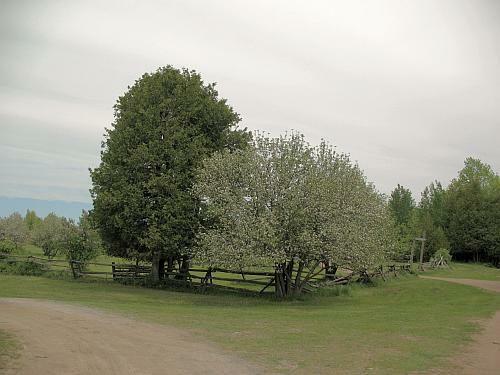
photo - mw
_______________________
Lisa Robertson interview
with Andy Fitch
Much of my critical prose remains occasional simply because I don’t have much time. When I write a catalogue essay (as in the case of some Soft Architecture pieces) or give a lecture (as with most of the Nilling projects), I try to make that occasion work toward my own current interests. Here I had the idea to construct a book of linked essays, loosely exploring a conceptual field and used a series of lecture invitations to explore that concept. I never have the time to both fulfill my institutional invitations and to write an unrelated book. I work slowly and just can’t crank out six essays. Similarly, back when I started The Office for Soft Architecture’s occasional works, I supported myself as a freelance writer so had to find a means of bringing my economic life together with my research and creative interests. I suppose I foreground these contexts out of gratitude.
(....)
Canadian art writing includes a kind of minor tradition of the parallel critical text. My prose has developed in this context. I don’t believe that practices of critique need to make art and its institutions more palatable for anybody. I don’t think literary criticism inevitably should make texts easier to consume. Interpretation doesn’t compel me, not as a reader or a writer. It interests me to elaborate upon a work’s problems—in the most positive sense, to probe the problematics I discover (not to gloss over these problems, but to complicate them further, to make them juicier). Often that seems the most engaged and respectful stance. Hadley and Maxwell, the artists whose installation I responded to for “Perspectors/ Melancholia,” don’t want critics to turn their juicy, complex, problematic work into something easy. They want viewers to engage its difficulty, its layeredness, multiplicity, multi-textuality, openness. My job does not consist in creating closure, but rather exploring the openness I find present in a work.
...(more)
The ConversantJune 2013
...a monthly journal featuring serial interview projects, talk poetries, and interviews between poets and other language-based artists. It publishes both transcriptions and multimedia recordings.
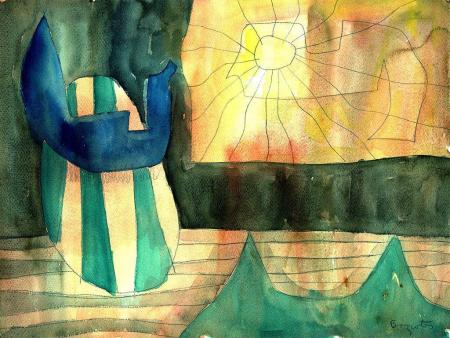
seascape
William Baziotes
d. June 6, 1963
_______________________
The Emptiness of Philosophy and the Secret of Its Splendor
larval subjects
I mean this in a good way. No, really, I’m serious. If there’s a splendor, a greatness, to philosophy and theory, then it lies in its emptiness. If there’s an emptiness to philosophy, this lies in its utter absence of a content that would be its own and abide throughout history. Philosophy is like a Lacanian analyst, something devoid of abiding content, and all of you know how nifty I think Lacanian analysts are.
Oh sure, there are philosophy textbooks that claim philosophy has a content uniquely its own. “What is the ultimate nature of reality?” “What is knowledge?” “Does knowledge exist?” “What are we?” “What ought we to do?” “What is the ground by which we distinguish the difference between right and wrong?” These textbooks like to say that there are perennial questions of philosophy that abide throughout history; questions that are unique to philosophy. Maybe. Yet my sense is that philosophers who talk in this way confuse grammar with history. The fact that a question might grammatically have the same structure for both Plato and Brandom, does not entail that historically they are they same question.
... philosophy always comes after, not before. Philosophy is not a propaeduetic to all other fields of inquiry, but is that form of reflection that emerges when old ways of living the political, knowledge, being, ourselves, and so on have collapsed and new and unprecedented ways of encountering ourselves, living the social, and encountering the world have come into being. (....)...(more)
The Evental Conditions of Philosophy and Thinking from the Real
larval subjects
_______________________
Speculations: A Journal of Speculative Realism
IV, June 2013
“The Horror of Darkness” [pdf]
Toward an Unhuman Phenomenology
Dylan Trigg
_______________________
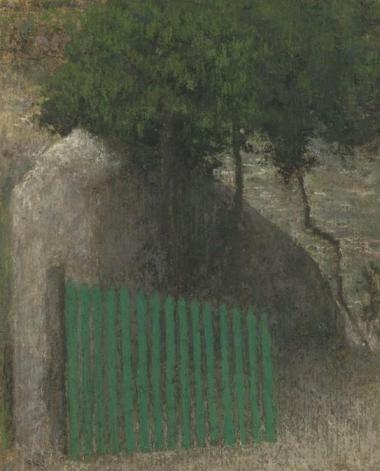
La Barričre
1893
Ker Xavier Roussel
d. June 6, 1944
_______________________
How To Read Agamben
Adam Kotsko
la review of books
(....)
... one could rightly ask what in Agamben’s work is his own — aside, of course, from the aleph-notes. Some of his originality can be traced to the way he brings together Heidegger and Benjamin, along with other major figures such as Michel Foucault, Carl Schmitt, Hannah Arendt, and Aristotle. Leaving aside questions of intellectual genealogy, however, much of what is most distinctive about Agamben’s style of thought comes from his love of paradox and contradiction. For instance, following up Benjamin’s research agenda, he traces the notion of the sacredness of human life back to the homo sacer — an origin that, far from indicating that human life has exceptional and unconditional value, actually refers to a form of human life that has been deprived of all legal protection. And instead of marveling at how much our concept of the sacredness of human life has changed, he argues that the old meaning still stands: the state that respects the sacredness of human life is actually a machine that threatens to turn every one of us into a defenseless homo sacer.
This love of paradox is not simply a rhetorical tic. It deeply shapes Agamben’s political analysis, which seeks out places where our accustomed categories begin to overlap and break down....(more)
_______________________

Composition dans la forźt
1890
Ker Xavier Roussel
_______________________
Georges Perec’s “La Boutique Obscure”
Reviewed by Stefanie Sobelle
words without borders
(....)
Translating Perec is notoriously difficult—how does one translate a novel without the letter E, for instance? Yet translation is its own kind of OuLiPian exercise, so as the youngest member of the exclusive group and only the second American included, Daniel Levin Becker is in a uniquely insider position to work through the complexities of Perec’s writing. Whereas the original version closed with an essay by Roger Bastide, the new translation closes with an afterward by Becker, in which he suggests, “La boutique obscure is not a harder book for a translator than A Void, certainly. But neither is it altogether easier . . . to intuit the subconscious logic and illogic of a man who at one point in his life chose to write a novel without the letter E, and was even known to spend an evening here or there eliding it in conversation.”
Of course, recounting one’s dreams is a form of translation, from notion to description. Dreaming too is translation, conjuring one’s memories and impressions into images and scenarios. Perec knows that the act of writing his dreams will affect how he recollects them, that dreams are no more real than memories or desires. La boutique will not help readers “know” Perec any better. Nothing can. Dreams do not offer insight into one’s psyche after all. Still, Perec suggests that he has no choice but to leave this “bundle of texts” “as an offering at the gates of the ‘royal road,’” and it just might be his most raw offering of all.
...(more)
_______________________
New Writing from Sri Lanka
words without borders
An Introduction to Sri Lankan Literature
Ru Freeman
Malinda Seneviratne
Sri Lanka, which boasts a 92% rate of literacy—the highest in South Asia and among the highest in Asia—has a long storytelling tradition. What is perhaps special about literature in this country is the extent to which the oral tradition has complemented a vast body of literature spanning many genres in written form. Given the powerful impetus that Buddhism had and has on scholarship and literature in Sri Lanka, both prose and verse in the country have drawn heavily from Buddhist parables. Even in the oral tradition, complex philosophical concepts and ideas are illustrated using stories from the Buddha’s life as well as the jathaka stories, i.e. narratives of the past lives of Siddhartha Gauthama.
For these reasons, perhaps, Sri Lanka is blessed with a rich repository of narratives and narrative styles in the written and oral traditions as well as a population that is culturally ready to receive such narratives
_______________________
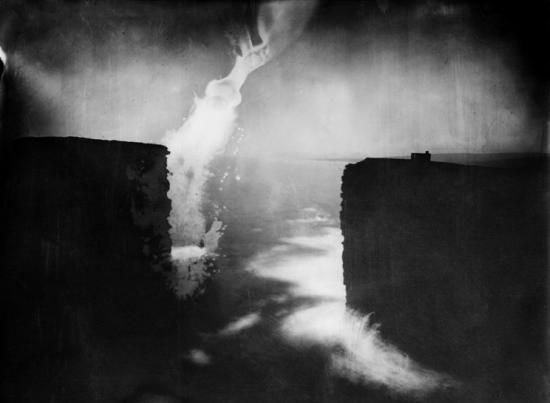
Dun Briste sea stack
The Point of the Deliverance
Alex Boyd
via
_______________________
The United States Of Whatever
Ecocide And The Soul Of A Nation
Phil Rockstroh
The reality of and the outward toll inflicted by greenhouse gas engendered Climate Change is clearly evident (to all but the corrupt and devoutly ignorant) e.g. increasingly destructive and deadly tornadoes and hurricanes, destruction of marine life, severe droughts and rapacious wild fires — landscapes of death, scattered debris and shattered lives.
But what are the psychical affects of chronic denial, noxious indifference and compulsive prevarication as related to a matter as all encompassing and crucial as our relationship with the climate of our planet?
Our current catastrophe of estrangement, termed “our way of life”, we experience as a denuding of resonance, meaning, and purpose, as a prevailing sense of emptiness and unease, as a craving for distraction, as an inchoate longing for change and transformation, yet a diffidence to the point of paralysis insofar as any means to expedite longing and libido into societal-altering action.
Estrangement from nature is estrangement from the landscape of the soul. The cosmos and the soul carry the same blueprint; the forces were forged in the same fires of infinity. In matters, galactic and quotidian, there is not a form that rises, waxes and wanes in nature that does not have an analog in our human physicality, faculties, and endeavors.
To turn a blind eye to the natural world, as we have done, translates into psychical ecocide. Perception is degraded. Language truncated. Life becomes dispossessed of purpose and meaning. Apropos, the rise and banal persistence of: The United States of Whatever.
...(more)
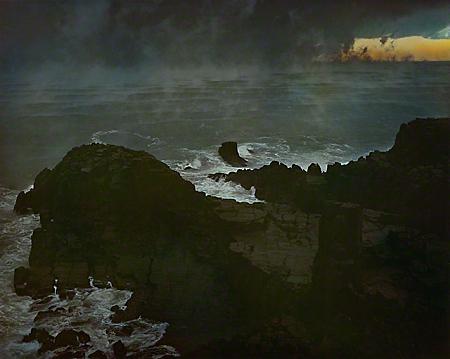
Eroded Sea Cliff at Tojinbo
1960
Hiroshi Hamaya
1915–1999
1 2 3 4
_______________________
The (Less Than) Eternal Sea
The Poet’s Metaphor and the Styrofoaming of the Waters
Lewis Lapham
(....)
Almost as soon as I could read I began with Ishmael’s setting foot aboard the Pequod and with the searching in an atlas for the track of the great white whale. My father patiently untied the knots of metaphor in Melville’s prose, discussed the virtues of Queequeg and Tashtego, appended footnotes about ill-fated ancestors lost in their attempts to round Cape Horn, steered my further reading toward Richard Henry Dana Jr.’s Two Years Before the Mast and Samuel Taylor Coleridge’s The Rime of the Ancient Mariner, to the voyages of Walter Raleigh and Francis Drake. Meanwhile, at grammar school in grades five, six, and seven, I was moving up from the Greek gods and heroes, among them Odysseus and his wide-wandering on the wine-dark sea, to the various discoveries of America by Viking seafarers, Christopher Columbus, and the Mayflower, in eighth grade to the battles of Actium and Trafalgar.
Conrad says the love of the sea is in fact the love of ships, the thought coming to him in 1905 as an affectionate memory of the New South Dock as it was to be seen in the 1880s, “fifty hulls, at least, molded on lines of beauty and speed,” square-rigged and metal-plated, “moored all in a row, stem to quay, as if assembled there for an exhibition not of a great industry but of a great art,” such a sight as “no man’s eye shall behold again.” So, too, the sight of the United States Navy in San Francisco Bay between 1942 and 1945, its fleets assembled for war in the sublime and treacherous Pacific.
Seventy years have come and gone, but I still can see ships of every then-known tonnage, armament, and design -- aircraft carriers, destroyers, oil tankers, submarines, light and heavy cruisers, trawlers, minesweepers, PT boats -- lying at anchor or getting underway on the turn of a morning’s tide. I didn’t know how to step a mast, or tell the difference between a sandbar and a reef, but I knew that the Battle of Midway was fought somewhere in the same degree of longitude that had seen the end of Captain Ahab, and I contrived to picture myself as somehow engaged in mankind’s age-old struggle with the mystery and power of the sea.
The conceit was not that far-fetched....(more)
_______________________
This sadness is not mine
Doina Ioanid
Translation: 2011, Florin Bican
This sadness is not mine. It is the sadness of old people who can no longer climb stairs, the sadness of the child who cannot speak, the sadness of the man raging against his own helplessness, the sadness of this retard spring feeding upon my dead, the sadness of the woman who can’t seduce her husband any more, the sadness of the days that can’t abide, the sadness of the girl devoured by the light of the north. This sadness is not mine, but all the same, I can’t get rid of it.
Translator’s note: Doina Ioanid or the epiphany of melancholy
(....)
Her prose poems are just as many epiphanies, trimming poetic perception – and expression – of all excess baggage. Yet stark they are not. They are, rather, streamlined vehicles (deep-sea vessels spring to mind), and very sophisticated ones at that, meant to take the reader beyond usually unquestioned borders, into an abyss both familiar and scary. While exploring herself, Doina Ioanid seems to trigger off in the reader an irrepressible urge to replicate the process with his/her own personal data. Never was intimacy more discreet – or more universal, for that matter. And that’s what makes Doina Ioanid’s poetry so substantial: the constant yet delicate delving into a multilayered, multifaceted reality in a redemptive attempt to make sense of things without robbing them of their aura. It’s in their inner radiance that epiphany manifests itself, making Doina Ioanid’s poems transcend the harshness of personal experience into a realm verging on both James Joyce’s epiphanies and Gerard Manley Hopkins’ inscapes: Way too tired, way too myopic. Even my name, a squashed clam, sinks through my skin deep within me, past soft tissues, past organs pulsating like terrified suns, deep down where none of the things on the outside can force their way in any more. Doina Ioanid’s poems are just as many instances of complete combustion – acts, thoughts, emotions, memories and feelings are purged of all randomness until exalted to vibrant albeit relaxed significance. There’s not one word too many in there, and the poor translator has a hard time rearranging the vastness and intensity of Doina Ioanid’s poetic perception and expression into an exquisite set of Chinese boxes. Moreover, these Chinese boxes constantly communicate with each other, not only within the same volume, but also from one volume to the other. When translating Doina Ioanid’s poems one has to be at one’s most alert in order not to miss the relevant channels of communication. Still, it’s exhilarating when one hears the translation humming with a melody of its own and recognizes (with a sigh of relief!) the ioanidness of the translated text. Even if one is consumed by its combustion…...(more)
.....................................................
Doina Ioanid
Translated from the Romanian by Florin Bican
exquisite corpse
(....)
At 32 fury slams into walls and bounces back against me. The diamond sky has already fallen on me. Even rebellion’s been dropped like a flag in the dust. At 18 I knew at least whom I was warring against, whose windows I ought to be smashing, whom I should rail at. Now everything appears to be irrelevant. I’m just left with this here threatened body, days and nights out of which I attempt to extract the odd meaning. And, above and beyond everything, this present moment on a cloudy morning, when I lie with my breasts crushing against your chest. Or perhaps this is just another utopia.
A gritty-voiced female black singer moans in the background, sucking in the whole room’s loneliness. Through the window, the light of the streetlamp. My hands wander over the shoulders still frail, refusing the padding of muscles. The daily dross washes away from us. The black singer’s voice fades away. My sleep next to you. Searching round for the heat of the thigh. Beauty is born under the palms of my hands. Dreams migrating from one to the other. Learning the light once again in the morning, the face under threat from the street noise. I’m pressing my mouth to your shoulder and my humming senses reach out for you. When I can take it no more, I press my forehead against the wall and the wall booms away to the point of exploding. I open the window attempting to breathe. Everything becomes bearable: we can sit opposite each other as we sip at hot chocolate talking about a million trifles. And still, like a soft winding scarf, the scent of your flesh is circling my neck with its coils. Tighter and tighter.
Wrapped up in silk scarves I stand at the edge of the world, good as gold. And being good becomes me, don’t you know. The only thing is, my blood’s not as good as I am, nor are my ink-dipped fingers. I’m telling myself I have grown, I put on a serious face and I’m going to work. Yet I can hardly wait to get back home, for you to unwrap me from silk scarves ever so gently (as patient as a merchant of Damascus), to give me a new name and speak to me of our two bodies joined together, more beautiful still than the Adriatic.
Too tired, too myopic. Even my name, a squashed clam, slowly sinks through my skin deep within me, past soft tissues, past organs pulsating like terrified suns, deep down to where none of the things on the outside can force their way in any more.
Keep me away from this autumn, keep me away from the people, away from the fields bristling with stubble… Take me in your arms and keep me away from myself, lest I get lost among all these hideous heads of old women popping up in the light of the evening.
...(more)
Doina Ioanid at Poetry International
_______________________
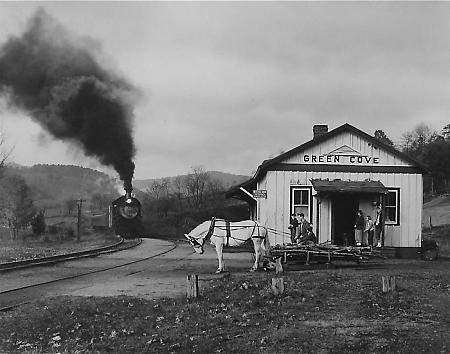
Maud bows to the Virginia Creeper
1956
O. Winston Link
1914 - 2001 _______________________
The Faraway Nearby – Rebecca Solnit
reviewed by Teow Lim Goh
Full Stop
(....)
In the memoir, Solnit delves into stories seemingly distant from her own life. I keep returning to an early passage on her mother; in fact, the first time I read it, I photographed the page and sent it to a patient friend, “Sometimes it’s valuable to return to the circumstances of childhood with an adult’s resources and insights, and that time around I realized I could not feel at all. Not for her, or for myself, except a dim horror, as if from a long way away. I had returned to the state in which I had spent my childhood, frozen, in suspended animation, waiting to thaw out, to wake up, to live.” For Solnit, the near is perilous and in order to cope, she reaches for the far. She can say more in telling stories about Frankenstein and Che Guevara than directly about herself.
The memoir’s title encapsulates this oblique approach. Georgia O’Keeffe moved from New York to rural New Mexico in an era when travel to the desert West involved long journeys on the transcontinental railroads; she signed her letters to her friends “from the faraway nearby.” It was also the title of Solnit’s column in the nature and ecology magazine Orion in the aughts, in which she considers, among other things, the juxtaposition of prisons and paradises in Thoreau’s Walden, the environment in country music, and the meaning of revolution. In an interview with The Believer, she has also said, “I am a homebody in that my main urge is to deepen my knowledge of known and loved places and regions rather than jump into entirely new territory.”
...(more)
_______________________
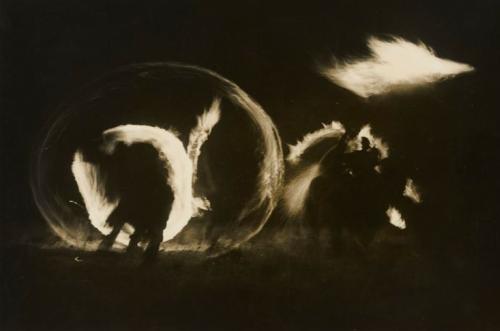
Sai no Kami
(Fire Festival, New Year's Ritual)
Hiroshi Hamaya
1940-46
_______________________
MILL OF PARTICULARS
The bLog of Robert Kelly
Poetry is easy.
It is an imitation
of what does not exist
circuit diagram of a new self
you suddenly briefly have to be
and suddenly you are legs and light and
nothing but dance
and nothing dances but you.
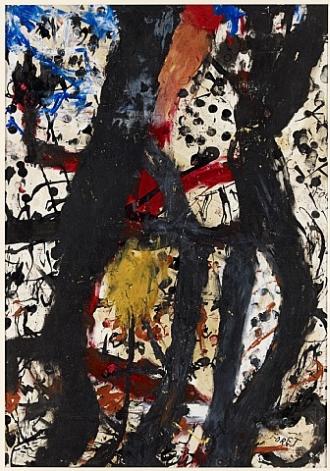
Forźt
1937 - 1942
Louis Soutter
b. June 4, 1871 louis soutter, the tremor of modernity
_______________________
The End of Thinking
Giorgio Agamben
translated by Peter Carravetta
mediafire pdf
(....)
Thinking: we can think only if language is not our voice, only if we fathom the bottom of our voicelessness. But in truth, there'sno bottom. Such an abyss is what we call the world.
Logic shows that language is not my voice. It says moreover that the voice, though it has been, is no longer, nor can it ever be. Language takes place in the non-place of the voice. Which means that, concerning the voice, thinking has nothing to say. This we may call its piety.
So then the fleeing, the pending of the voice in language must come to an end. We can finally stop holding language, and the voice, in a suspended state. If the voice has never been, if thinking is the thinking of the voice, then it has nothing to think about A thought which is fulfilled, in other words, has no thoughts left to think.
(....)
_______________________
Heinrich Heine: Two Poems, after the French Transcreations by Gerard de Nerval
English versions by Jerome Rothenberg after Nerval
The Castaway
Longing & love!
It’s all broken: I’m lying here sprawled on the shore, deserted & naked, a corpse that the sea has spit up with contempt.
Before me the ocean fans out, a vast desert of water, while in back of me nothing but exile & grief, & over my head clouds sail by, grey & formless, the daughters of air, who draw water up from the sea, whisps of fog that they lift with great effort, then let them fall back on the sea, exquisite & useless, just like my life.
Waves murmur, gulls caw, old memories seize me, dreams forgotten, snuffed out, images slow to return, sad & tender.
...(more)
_______________________
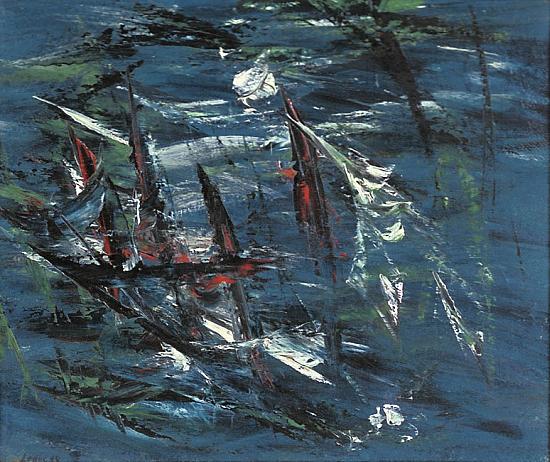
Fernand Leduc
b. June 4, 1916
_______________________
She Went Down the Highway to Seal the Lineage
Robert Gibbons
Lumpy pudding
She went down the highway to seal the lineage: pick up daughter & her daughter to take them down to another state to show mother her first great-granddaughter in order to keep the image grown to four years fresh in an elder mind. It was practically modern African. Left alone without a vehicle on the hottest day in over a year, according to the local weatherman, (no old village griot). Showered just after she left, pressed whitest linen shirt hovering above iron under ceiling fan, put on boots, & torn jeans hoofing it out door before sun got too high, or clock reached eight. They don’t call main drag Forest Ave. for no reason, trees all gone, but sea might as well be Dead in the distance. That hot already wilting old body inside linen & denim shroud. Black canvas shoulder bag with three books, writing pad, felt-tip pen, water bottle, second water bottle filled with red wine, Finnish crackers, cell phone & wallet weighting me down, but failed to turn me round. Granted, kept looking over shoulder like a criminal for the bus, but refused to put hat on over Gallic greased hair. Halfway down Forest (yes, ALL trees gone!) in this heat a veritable desert, & after fifty glances over shoulder, when # 4 bus approached it might well have seemed a camel caravan to a thirsty man.
...(more)
_______________________
David Bromige: A Selection
by Meredith Quartermain
from From the First Century (of Vulnerable Bundles)
8
The lost picture of thinking
The picture of lost-in-thought
What are you looking for
Some poems including history
Why are you looking for
There are cracks in thinking
Bits jut up of its smooth mosaic
Trying to sell you something
Those are safe pavements
Workingclass history
But all words are beautiful
Like the eye of the beholder
Like four bars without singing
Admit the sinking feeling
Live in the ecstasy
Remember why
It’s only an opinion
Lying fallow between furrows
The corporation yard is next
Never get lost for long
Often long to get lost
That brings us to our senses
The poet seeks the lost picture of thinking, he wants to show people how thinking actually occurs. He thinks this would be a good thing for people to see. And he also seeks to create another picture of lost-in-thought, of enrapture and preoccupation. Why? To help others avoid tripping up or slipping in? Certainly, he would not be averse to bringing some bracing disillusion to his readers. Much public thinking “these days” done to sell one (on) something. Like, that those “pavements” (of thought?) are safe – which they could never be! (Something about this entire process resembles a run of luck, a gamble, with this difference, he can never actually win or lose beyond a shadow of doubt). Charles Bernstein: “Poetry is a swoon/ with this difference:/ It brings us to our senses.”
There are opinions, and then there are corporations, who make their opinions stick. There are seizures which register as the truth, that do not communicate. Poetry? A telegram is more like legal tender. Grandson of ostlers scene-shifters & gamekeepers.
...(more)
Golden Handcuffs #10
(Summer, Fall 2008; Vol. 1, No. 10)

David Bromige
October 22, 1933 - June 3, 2009
Photograph by James Garrahan
David Bromige at EPC and the Poetry Foundation
Ten Poems
from As In T as in Tether
David Bromige
jacket
_______________________

photo - mw
_______________________
Unacceptable
Recovering Paul Goodman
Judith Levine
Our abundant society is at present simply deficient in many of the most elementary objective opportunities and worth-while goals that could make growing up possible. . . . It is lacking in honest public speech, and people are not taken seriously. It is lacking in the opportunity to be useful. It thwarts aptitude and creates stupidity. It corrupts ingenuous patriotism. It corrupts the fine arts. It shackles science. It dampens animal ardor. . . . It has no Honor. It has no Community.
These words could have appeared yesterday on the Occupy Wall Street Facebook page, or in Mother Jones during the Reagan years. Instead, they come from a book published in 1960: Growing Up Absurd, by Paul Goodman. The book anticipated the coming critique of American culture. It became an instant bestseller and an iconic text of the ’60s peace and social justice movements.
Then, after a final run in 1973, Growing Up Absurd went out of print and, along with its author, was forgotten. I have yet to meet a person under 40 who recognizes Goodman’s name. Indeed, the promo for Jonathan Lee’s engaging documentary Paul Goodman Changed My Life calls its subject “the most influential man you’ve never heard of.”
Now New York Review Books has reissued Growing Up Absurd, appropriately, in its Classics series....(more)
_______________________
Bradley Manning: Soldier/Prisoner/Whistleblower
Websites/Archives/Biographies
collected by Michael Benton (Dialogic)
Killing the Illusion
Bradley Manning on Trial
Binoy Kampmark
It is time to pull out the stops. Yes, efforts have been made, some commendable, some noisily admirable, and the protesters have gathered constantly over the thousand and more days that Private Bradley Manning has been held. The trial is about to begin, larded with 22 charges on the prosecution’s part, including espionage and aiding the enemy.
The campaign against Manning for his part in Cablegate has been insidious. The whistleblower, for all the heroic properties he or she might have, is treated as the betrayer of covenants, contracts and promises. The fundamental weakness of any whistleblowing regime is its construction from the inside. It remains a creature of establishment, a design of state authorities to ultimately restrain disclosure rather than endorse it. Ultimately, there is never any guarantee of protection against prosecution. One must be punished for doing a good deed – that’s the tribal prerogative.
...(more)
The public may never know whether justice is properly done unless someone leaks the details of this trial about leaks.
—
Eugene Robinson
_______________________

photo - mw
_______________________
Miklós Szentkuthy’s Marginalia on Casanova
David Auerbach
waggish
(....)
The series (St. Orpheus Breviary), or at least this first volume, is a tour through the European past, a tour through Szentkuthy’s labyrinthine library, twisting through the stranger paths of civilized minds to counter the dominant stories we learn as we’re growing up. Szentkuthy’s choice of Casanova (1725-1798) of all people as his intellectual centerpiece for the first volume is perfectly representative. Casanova’s love life doesn’t interest him per se. There is very little of the gossip or scandal of Casanova in here. He is much more attuned to Casanova’s sensibility, his emotional responses, and his ethics (such as they are). That he compares Casanova to Pope Benedict XIV should give some idea of what he’s after.
Szentkuthy also compares Casanova to Proust: both spent their last years reflecting ambivalently on the social high life in which they had previously been engaged. But for Szentkuthy, Casanova is the more interesting figure because he conducted his life with far less remove than Proust, with less concerted intellectual analysis.
His goal, as far as I can summarize it, is to suspend his novel precisely between the intellectual realm and lived experience. He wants neither the rarefied abstraction of the essay, nor the conventional journalism of realism or the diary. For him:
a ‘thought’ is both: an absolute description together with an absolute stimulation. In other words, exactly that has become the crown of intellectuality, whereas previously it had been a blemish: its slaves are copying and lyrical bias. If we realize that these two blemishes are two prime merits and two possibilities which exclude all else–that will be a Copernican revolution in the history of thinking as Kant’s was in his time.
I am convinced that the most monotonous fiasco of a landscape description lies closer to the natural history of logic, truth, and intellectuality than all the philosophers from Plato to Kant…only décor is true logic.
...(more)
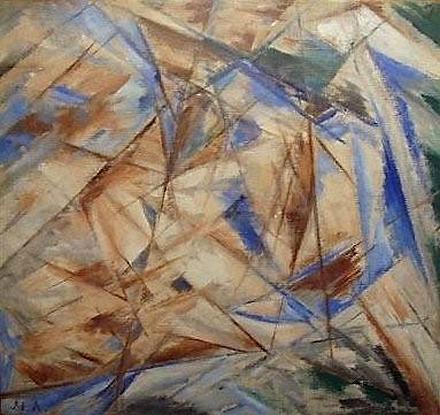
Blue Rayonnism
(The Fool)
(1910)
Mikhail Larionov
June 3, 1881
_______________________
Wichita Vortex Sutra Ii (Excerpt)
Allen Ginsberg
Three five zero zero is numerals
Headline language poetry, nine decades after Democratic Vistas
and the Prophecy of the Good Gray Poet
Our nation "of the fabled damned"
or else . . .
Language, language
Ezra Pound the Chinese Written Character for truth
defined as man standing by his word
Word picture: forked creature
Man
standing by a box, birds flying out
representing mouth speech
Ham Steak please waitress, in the warm café.
Different from a bad guess.
The war is language,
language abused
for Advertisement,
language used
like magic for power on the planet:
Black Magic language,
formulas for reality-
...(more)
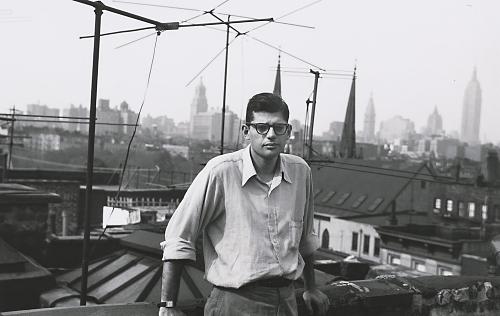
Allen Ginsberg
b. June 3, 1926
photo by William S. Burroughs
Poetry, Violence, and the Trembling Lambs
or
Independence Day Manifesto
Allen Ginsberg
_______________________
Still Dancing: Drive as a Category of Political Economy
Jodi Dean
One of Slavoj Žižek’s most significant theoretical contributions is his activation of Jacques Lacan’s teachings on drive. Žižek explores drive throughout his work, using drive to rethink subjectivity, ideology, and ontology. While some theorists focus on the subject of desire, critically interrogating the fantasies that attach it to law, Žižek has opened up the category of drive, confronting what it is that impels us, that invests us in activities or patterns or objects exceeding interest, life, even our own good. As Adrian Johnson puts it, “thanks to ‘the death drive’ (as disruptive negativity), the human individual isn’t entirely enslaved to tyranny of the pragmaticutilitarian economy of well-being, to a happiness thrust forward by the twin authorities of the pleasure and reality principles.” Similarly reconfigured through drive, ideology becomes less a matter of what one knows and more a matter of what one does. The task of ideology critique correspondingly expands beyond exercises in demystification and exposure to include the practices and activities constitutive of a system, an expansion that enables Žižek to consider activity as a form of passivity and inactivity as disruption.
...(more)
_______________________
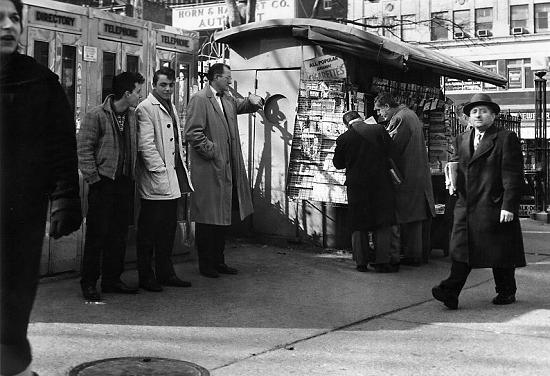
New York City in Photographs
1962-72
Bernard Safran
_______________________
On Studying Ourselves and Others
Liminalities
volume 9, issue 2
(2013)
edited by Tony E. Adams & Stacy Holman Jones
Performing Identity, Critical Reflexivity, and
Community: [pdf]
The Hopeful Work of Studying
Ourselves and Others
Tony E. Adams & Stacy Holman Jones
(....)
Performing the work—of identities and communities—is work that we must do, question, and transform as scholars, specifically in our endeavors as ethnographers and autoethnographers. While ethnographic research has long included identity as a primary focus, how such research has occurred has been a topic of concern and debate. How do we study others and how do we study ourselves, asking the questions above and then waiting for and articulating— and not ignoring or exempting ourselves from—the replies? How do we become— how do we write and embody—the kinds of people we want and need to be in our research for ourselves and for others? In our lives and worlds? How do we become “answerable” in our words and our actions, and how is our work both responsible to and liable for the meanings it creates?
Performing the work of identities and communities as ethnographers, especially in critical, reflexive ways, also means treating cultural practices, modes of address, and debate as sources of hope: hope that people will be able to meaningfully participate in social life equally and on their own terms—whatever these terms might be—and hope that, out of a desire for fairness and recognition, we can let go of the fear that certain kinds of people, places, and practices threaten the so-called pre-destined and privi- leged “natural” social order. This hope yearns for connection, for the considered and critical return of our attentions and affections without eliding or silencing the im- portant and difficult questions about our place in and practices of research. This hope yearns for an embrace of uncertain, shifting, and radically open identities, relation- ships, and embodiments. This hope demands careful listening and learning in our en- gagement with others, and a willingness to live with/in uncertainty and to accept vul- nerability, risk, and the ever-present absence and silence of loss. This hope revels in the joining of hearts, bodies, and minds in “doing and redoing, breaking and remaking meaning” . This hope is the work of a critically-motivated and performance- minded ethnography and autoethnography. _______________________
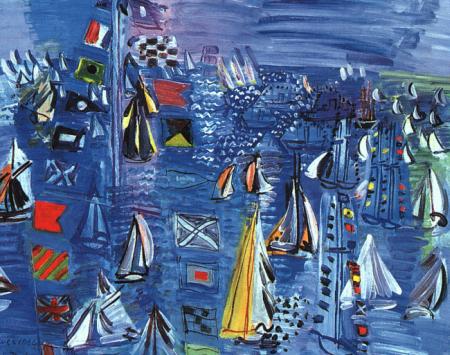
Regatta at Cowes
(1934)
Raoul Dufy
b. June 03, 1877
_______________________
EPC Digital Library
integrates archives from Eclipse & Jacket 2 Reissues along with our extensive collection of books and periodicals from EPC's own collection.
_______________________
Pina Bausch & Clairice Lispector
The poet's novel
Laynie Browne
jacket2
When realism isn’t real, where is a writer to go? Meaning, the sentence is a construction which feels at least as habitable as the bus which carries a poet to an unfamiliar town, and the couch upon which the poet sleeps later that night. When realism isn’t enough, isn’t authenticated or represents a fractional or purely outward series of events, poets turn to the body of the sentence upon which to recline, repose, deconstruct and reject any sort of frame which insists upon the “real” being limited to finite perceptions. A sentence may break, with the force of bodily gesture, something more fluid. When I think of the poet’s novel I think of an oblique truthfulness. The choreography of Pina Bausch comes to mind, as an example of art which echoes the interior and bodily aspects of the real. What is the difference between realism and the real? I’d like to preface these remarks by saying that this commentary is in no way a critique of realism, but instead a depiction of a category of the real which attempts something entirely different then say, a realistic novel evoking a specific time and place. In the work of Pina Bausch we are called to question: how does the real manifest in the body? How does the real impel a body to move? How do we represent the unsayable?...(more)
_______________________
Foundations for Moral Relativism
J. David Velleman
Open Book Publishers
... an independent academic publisher, run by scholars who are committed to making high-quality research available to readers around the world. We publish monographs and textbooks in the Humanities and Social Sciences, and offer the academic excellence of a traditional press, with the speed, convenience and accessibility of digital publishing. All our books are available to read for free online.
via Ingrid Robeyns
_______________________
Fighting Post-Modern Enclosure
We Are All Luddites
David Rosen
counterpunch
(....)
The battle against post-modern enclosure continues the long-fought struggle against privatization and commodification. We witness it in the ongoing global struggles against the corporate expropriation of precious natural resources — oil and gas, mineral wealth (e.g., copper, lithium) and arable lands and water — taking place in South America, Africa, the Arctic … and in the U.S. of A.
In the U.S. today, the enclosure movement involves more than the plunder of oil, gas and coal. It is being fought over everything with the word “public” attached to it. So, schools, prisons, hospitals, water systems, roadways, waste management and even police services are being privatized. Enclosure is also being fought over the extension of private-property copyright control of the human genome and Monsanto’s commodification of the genes for soybeans, corn and other crops. It’s a process that has enriched the rich and made the rest of us pay for it.
Often overlook is how the enabling technology of 21st century capitalism, the digital signal, makes possible the Internet and everything we electronically take for granted, is a terrain of struggle over enclosure. The shift from analog to digital has made the imposition of private-property controls much easier. The digital signal — whether an email message, commercial transaction, phone call, musical selection, pornographic image or Hollywood blockbuster — is just a series of 1s and 0s. Thus, it is easier to monitor, commodify, price and regulate.
Yet, the digital signal’s very simplicity of structure and universality of adoption has made it so easy to innovative upon, but also easy to share, to copy and to hack. Because of its simplicity, digital-based technologies also subvert the push to impose market and government control. This fosters a digital common or Internet underground of hackers and Anonymous as well as mafia scam artists prowling for a sucker. This is the postmodern digital dialectic.
...(more)
_______________________
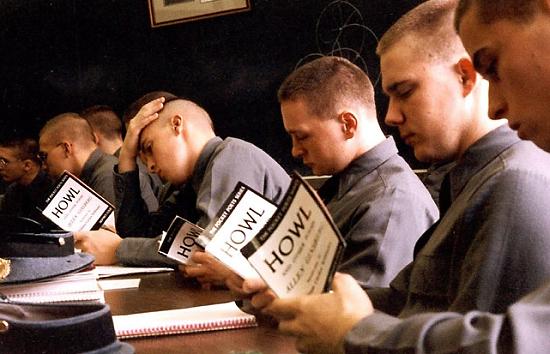
Cadets read Howl
Virginia Military Institute
photo by Gordon Ball
'The Poem That Changed America: "Howl" Fifty Years Later'
Greil Marcus
(....)
What sphinx of cement and aluminum bashed open
their skulls and ate up their brains and imagination?
Moloch! Solitude! Filth! Ugliness! Ashcans and unob
tainable dollars! Children screaming under the
stairways! Boys sobbing in armies! Old men
weeping in the parks!
Moloch! Moloch! Nightmare of Moloch! Moloch the
loveless! Mental Moloch! Moloch the heavy
judger of men!
Moloch the incomprehensible prison! Moloch the
crossbone soulless jailhouse and Congress of
sorrows! Moloch whose buildings are judgment!
Moloch the vast stone of war! Moloch the stunned governments!
Moloch whose mind is pure machinery! Moloch whose
blood is running money! Moloch whose fingers
are ten armies! Moloch whose breast is a cannibal dynamo!
Moloch whose ear is a smoking tomb!
Moloch whose eyes are a thousand blind windows!
Moloch whose skyscrapers stand in the long
streets like endless Jehovahs! Moloch whose factories
dream and croak in the fog! Moloch whose
smokestacks and antennae crown the cities!
— Allen Ginsberg, Howl
_______________________
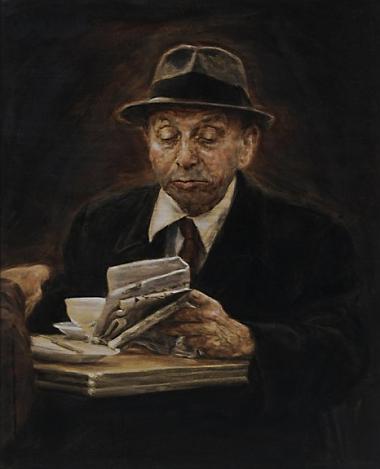
The Cup of Coffee
1966
Bernard Safran
b. June 3, 1924
_______________________
The Rebirth of History: Times of Riot and Uprisings [pdf]
Alain Badiou
|












































